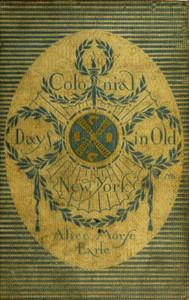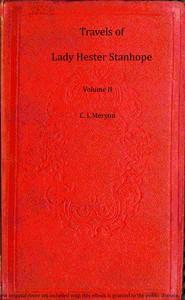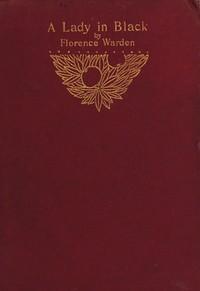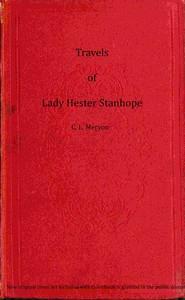Read this ebook for free! No credit card needed, absolutely nothing to pay.
Words: 66128 in 15 pages
This is an ebook sharing website. You can read the uploaded ebooks for free here. No credit cards needed, nothing to pay. If you want to own a digital copy of the ebook, or want to read offline with your favorite ebook-reader, then you can choose to buy and download the ebook.


: Colonial days in old New York by Earle Alice Morse - New York (State) History Colonial period ca. 1600-1775; New York (State) Social life and customs To 1775
COLONIAL DAYS IN OLD NEW YORK
THE LIFE OF A DAY
At the first break of day, every spring and summer morn, the quiet Dutch sleepers in the old colonial town of Albany were roused by three loud blasts of a horn sounded far and wide by a sturdy cow-herd; and from street and dooryard came in quick answer the jingle-jangle, the klingle-klangle of scores of loud-tongued brass and iron bells which hung from the necks of steady-going hungry Dutch cows who followed the town-herder forth each day to pastures green.
In New Amsterdam the town's cow-herd was Gabriel Carpsey; and when his day's work was done, he walked at sunset through the narrow lanes and streets of the little settlement, sounding at each dooryard Gabriel's horn, a warning note of safe return and milking-time.
What fishing was to the goodman of the house, knitting was to the goodwife,--a soothing, monotonous occupation, ever at hand, ever welcome, ever useful. Why, the family could scarce be clothed in comfort without these clicking needles! A goodly supply of well-knit, carefully dyed stockings was the housekeeper's pride; and well they might be, for little were they hidden. The full knee-breeches of father and son displayed above the buckled shoes a long expanse of sturdy hosiery, and the short petticoats of mother and daughter did not hide the scarlet clocks of their own making. From the moment when the farmer gave the fleece of the sheep into the hands of his women-kind, every step of its transformation into stockings was so tiresome and tedious that it is wearying even to read of it,--cleaning, washing, dyeing, carding, greasing, rolling, spinning, winding, rinsing, knotting,--truly might the light, tidy, easy knitting seem a pastime.
She had as a recreation, a delight, the care of
"A garden through whose latticed gates The imprisoned pinks and tulips gazed,"
a trim, stiff little garden, which often graced the narrow front dooryard; a garden perhaps of a single flower-bed surrounded by aromatic herbs for medicinal and culinary use, but homelike and beloved as such gardens ever are, and specially beloved as such gardens are by the Dutch. Many were the tulip bulbs and "coronation" pink roots that had been brought or sent over from Holland, and were affectionately cherished as reminders of the far-away Fatherland. The enthusiastic traveller Van der Donck wrote that by 1653 Netherlanders had already blooming in their American garden-borders "white and red roses, stock roses, cornelian roses, eglantine, jenoffelins, gillyflowers, different varieties of fine tulips, crown-imperials, white lilies, anemones, bare-dames, violets, marigolds, summer-sots, clove-trees." Garden-flowers of native growth were "sunflowers, red and yellow lilies, morning-stars, bell-flowers, red and white and yellow maritoffles." I do not know what all these "flower-gentles" were, but surely it was no dull array of blossoms; nor were their glories dimmed because they opened ever by the side of the homely cabbages and lettuce, the humble cucumbers and beans, that were equally beloved and tended by the garden-maker.
There was one element of beauty and picturesqueness which idealized the little town and gave it an added element of life,--
"Over all and everywhere The sails of windmills sink and soar Like wings of sea-gulls on the shore."
The beauty of the windmills probably was not so endearing to the settlers as their homelikeness. They made the new strange land and the new little towns seem like the Fatherland. The Indians greatly feared them; as one chronicler states, "they durst not come near their long arms and big teeth biting the corn in pieces." Last, and not least in the minds of the thrifty Dutch, the windmills helped to turn to profit the rich harvests of grain which were the true foundation of the colony's prosperity,--not the rich peltries of beaver, as was at first boastfully vaunted by the fur-traders.
"Buitterchee, buitterchee, comm Alican laidlechee tubichee vall."
Free books android app tbrJar TBR JAR Read Free books online gutenberg
More posts by @FreeBooks

: Travels of Lady Hester Stanhope Volume 2 (of 3) by Stanhope Hester Lady Meryon Charles Lewis Editor - Middle East Description and travel; British Middle East History 19th century; Women travelers Middle East Biography; Stanhope Hester Lady 1776-1839 Travel


: A lady in black by Warden Florence - Villages England Fiction; Young women Fiction; Dime novels; Mystery fiction





